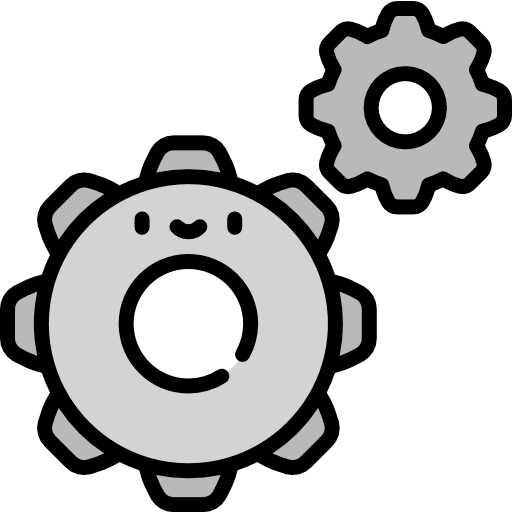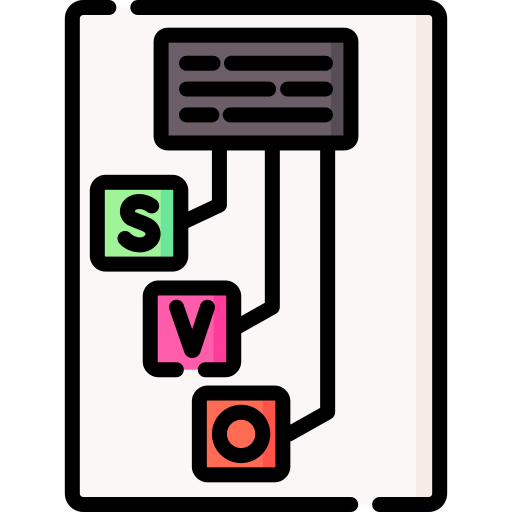 Survival Korean
Survival Korean
기초 문법
Foundational Korean: Grammar Basics
A | B | C | D | E | F | G | H | I | J | K | L | M | N | O | P | Q | R | S | T | U | V | W | X | Y | Z | ALL
A |
|---|
Adverbs (부사) | ||
|---|---|---|

DefinitionAdverbs are words that describe the manner in which an action is being done, such as "quickly" or "slowly". In Korean, a common advervial marker is the suffix -게 (as in 빠르게) though there are common instances where different ones are used (related to language origin) such as 히 as in 안녕히 or words that simpl are adverbs in and of themselves (i.e., 빨리). | ||
Affix | ||
|---|---|---|

DefinitionAn affix is a morpheme that is attached to a word stem to form a new word or word form. Affixes may be derivational, like English -ness and pre-, or inflectional, like the English plural -s and past tense -ed. They are bound morphemes by definition whereas prefixes and suffixes may be separable affixes | ||
Agglutinative Languages | ||
|---|---|---|

DefinitionAn agglutinative language is a type of synthetic language with morphology that primarily uses agglutination; one word can contain enough morphemes to convey the meaning of what would be a complex sentence in other languages. You wll commonly see words in Korean built of many morphemes with very specific meanings that otherwise need sentences in English to convey the same idea. | ||
Analytic and Isolating Languages | ||
|---|---|---|

DefinitionAn isolating language is a type of language with a morpheme per word ratio close to one, and with no inflectional morphology whatsoever. An analytic language is a language that primarily conveys relationships between words in sentences by way of helper words (particles, prepositions, etc.) and word order, as opposed to using inflections (changing the form of a word to convey its role in the sentence). | ||
C |
|---|
Circumfix | ||
|---|---|---|

DefinitionA circumfix is an affix which has two parts, one placed at the start of a word, and the other at the end. Circumfixes contrast with prefixes, attached to the beginnings of words; suffixes, attached at the end; and infixes, inserted in the middle. These don't exist in Korean but certain imported words may have them from the original language. | ||
Compound Words | ||
|---|---|---|

DefinitionCompound words are words simply made up of two or more nouns such as dog house or univeristy entrance exam. | ||
Content Words | ||
|---|---|---|

DefinitionContent words are words that have meaning. They can be compared to grammatical words, which are structural. Nouns, main verbs, adjectives and adverbs are usually content words. Auxiliary verbs, pronouns, articles, and prepositions are usually grammatical words. | ||
Culture (문화) | ||
|---|---|---|

DefinitionCulture is a collective cognitive programming that encompasses the social behavior, institutions, and norms found in human societies, as well as the knowledge, beliefs, arts, laws, customs, capabilities, and habits of the individuals in these groups. Culture is often originated from or attributed to a specific region or location. | ||
D |
|---|
Derivational Morphology | ||
|---|---|---|

DefinitionMorphological derivation, in linguistics, is the process of forming a new word from an existing word, often by adding a prefix or suffix, such as un- or -ness. For example, unhappy and happiness derive from the root word happy. This kind of morphology creates new lexemes, either by changing syntactic category or by adding substantial new meaning (or both) to a free or bound base. | ||
Dialects (방언) | ||
|---|---|---|

DefinitionDialect is the term for a sociopolitical definition of a language, more so than an actual linguistic one. Dialects are the languages spoken by the people who lack socioeconomic and political power in a society despite otherwise fitting the definition of a language. | ||
Direct Object (목적어) | ||
|---|---|---|

DefinitionA direct object is a noun (or object phrase) that receives the action of the verb. For example, I eat kimchi. Kimchi is being acted upon by the verb eat whereas I, the subject, is doing the action. | ||
F |
|---|
Function Words | ||
|---|---|---|

DefinitionFunction words are words that exist to explain or create grammatical or structural relationships into which the content words may fit. | ||
G |
|---|
Grammar (문법) | ||
|---|---|---|

DefinitionIn linguistics, the grammar of a natural language is its set of structural constraints on speakers' or writers' composition of clauses, phrases, and words. | ||
H |
|---|
Honorifics (존댓말) | ||
|---|---|---|

Definition존댓말 is a term referring to honorific speech in Korean. There are multiple levels of honor (as well as "humble") speech that involves the use of certain pronouns, terms, and verbal morphology that express very specific levels of honor onto others as well as humility on the part of the speaker. If it sounds complicated, it sure can be, but the vast majority of speech is carried out in only a few common speech registers/forms. | ||
I |
|---|
Indirect Object (간접 목적어) | ||
|---|---|---|

DefinitionIn grammar, an indirect object is the word or phrase that receives the direct object. For example, I gave kimchi to my friend. "My friend" is the indirect object since they are the recipient (to be very precise, they have a theta role of "goal") of the kimchi, but not being acted upon by the verb "give". | ||
Infix | ||
|---|---|---|

DefinitionAn infix is an affix inserted inside a word stem (an existing word or the core of a family of words). The only example of this in English is actualy an intensifier (often conflated with a certain curse word) - for example prefix, infix, root, suffix: un-f*******-believe-able | ||
Inflectional Morphology | ||
|---|---|---|

DefinitionInflectional morphemes (also called simply “inflections”) are suffixes that are applied to words to denote a grammatical meaning. For example, 김치가 is a subject whereas 김치는 is a topic and 김치를 is a direct object. The inflections have changed something about the grammatical meaning of the word. In these cases, it has change the role of word in the subject. | ||
L |
|---|
Language (언어) | ||
|---|---|---|

DefinitionA language is a structured system of communication. The definition of where one language ends where another begins can be tricky; dialects and languages are considered to be variations of one another with the language being the system of communication of the powerful and elites of a society. Other systems of communication like Spanish, Italian, and Portuguese are considered to be be separate languages despite have high degrees of mutual intelligibility. | ||
Loan Words | ||
|---|---|---|

DefinitionThese are words that Korean has "borrowed" from other languages. Technically speaking, Sino Korean words are actually loan words but due to huge amount of words that are borrowed, how long they have been in the language, they have their own special designation. More common loan words that we think of are things like 피자, 치킨 and so on. Many are even used as Konglish portmanteaus like 핸드폰. | ||
N |
|---|
Native Korean Words | ||
|---|---|---|

DefinitionThese are the indigenous words of the language that are completely unique to Korean. They do not come from outside. Many of these words, such as food words, have been "borrowed" by other langauges like 김치 or 김밥. | ||
Neologisms | ||
|---|---|---|

DefinitionNeologisms are newly form words that may or may not be widespread in a language at any given time. You will likely not find these words in dictionaries as they tend to be on the cutting edge of language use and not uniformly across different groups of speakers. | ||
Neologisms (신조어) | ||
|---|---|---|

DefinitionNeologisms are new words created in a language that may or may not become widespread and commonly used. | ||
Noun (명사) | ||
|---|---|---|

DefinitionA noun is a word that generally functions as the name of a specific object or set of objects, such as living creatures, places, actions, qualities, states of existence, or ideas. | ||
P |
|---|
Particles (조사) | ||
|---|---|---|

DefinitionIn grammar, the term particle has a traditional meaning, as a part of speech that cannot be inflected, and a modern meaning, as a function word associated with another word or phrase; generally in order to impart meaning. In Korean, you will these as 이/가, 은/는, 을/를, 한테/한테서, 에게/에세서, etc. | ||
Polysynthetic Languages | ||
|---|---|---|

DefinitionPolysynthetic languages are highly synthetic languages, where words are composed of many morphemes (word parts that have independent meaning but may or may not be able to stand alone). They are very highly inflected languages. Many examples of polsynthetic languages are found among Indigenous languages in North America such as Navajo, Cree, Nahuatl, | ||
Predicate | ||
|---|---|---|

DefinitionThe term predicate is used in one of two ways in linguistics and its subfields. The first defines a predicate as everything in a standard declarative sentence except the subject, and the other views it as just the main content verb and evertying that comes after. | ||
Prefix | ||
|---|---|---|

DefinitionA prefix is an affix which is placed before the stem of a word. Adding it to the beginning of one word changes it into another word. For example, when the prefix un- is added to the word happy, it creates the word unhappy. Korean has many prefixes such 불 meaning "no" or "not". | ||
R |
|---|
Root | ||
|---|---|---|

DefinitionA root is the core of a word that is irreducible into more meaningful elements. In morphology, a root is a morphologically simple unit which can be left bare or to which a prefix or a suffix can attach | ||
S |
|---|
Sino Korean Words | ||
|---|---|---|

DefinitionSino Korean words are the words in Korean that actually come from Chinese. This makes up a disproportionate amount of the vocabulary (some 70%). This is not uncommon as English has about 70% of its lexicon originating from French, Latin, and Greek. | ||
Slang (속어) | ||
|---|---|---|

DefinitionSlang is a type of language or words which are regarded as being very informal, more common in speech than writing, and are typically only associated with a particular context (e.g., workplace jargon) or group of people (e.g., skateboarding subculture). | ||
Structure (구조) | ||
|---|---|---|

DefinitionStructure refer to sentence-level comprehension of language, including how the arrangement of words within sentences impacts the meaning. Language structure understanding helps speakres interpret the meaning of complete sentences. | ||
Subject | ||
|---|---|---|

DefinitionTraditionally the subject is the word or phrase which controls the verb in a clause, and in certain languages, where the morphology also agrees by number/subject and/or gender. | ||
Subject (주제설) | ||
|---|---|---|

DefinitionTraditionally the subject is the word or phrase which controls the verb in a clause, and in certain languages, where the morphology also agrees by number/subject and/or gender. | ||
Subordinate Clauses | ||
|---|---|---|

DefinitionA subordinate clause, dependent clause or embedded clause is a clause that is embedded within a complex sentence. For instance, in the English sentence "I know that Bette is a dolphin", the clause "that Bette is a dolphin" occurs as the complement of the verb "know" rather than as a freestanding sentence. | ||
Suffix | ||
|---|---|---|

DefinitionA suffix is an affix which is placed after the stem of a word. Common examples are case endings, which indicate the grammatical case of nouns, adjectives, and verb endings, which form the conjugation of verbs. Suffixes can carry grammatical information or lexical information | ||
Superordinate Clauses | ||
|---|---|---|

Definitionhe terms subordinate and superordinate are relative terms. They describe the relationship between clauses in what is called the Clause Hierarchy - for example - [It was raining] when [I left home]. | ||
Syntax (통사론) | ||
|---|---|---|

DefinitionIn linguistics, syntax is the study of how words and morphemes combine to form larger units such as phrases and sentences. | ||
Synthetic Languages | ||
|---|---|---|

DefinitionA synthetic language uses inflection or agglutination to express syntactic relationships within a sentence. Inflection is the addition of morphemes to a root word that assigns grammatical property to that word, while agglutination is the combination of two or more morphemes into one word | ||
T |
|---|
Topic | ||
|---|---|---|

DefinitionIn linguistics, the topic, or theme, of a sentence is what is being talked about, and the comment is what is being said about the topic. This division into old vs. new content is called information structure. In Korean, the particles 은/는 will mark the topic of the sentence. | ||
V |
|---|
Verb (동사) | ||
|---|---|---|

DefinitionA verb is a word that in syntax generally conveys an action, an occurrence, or a state of being. In many languages, verbs are inflected to encode tense, aspect, mood, and voice, though these are not necessarily required. | ||




